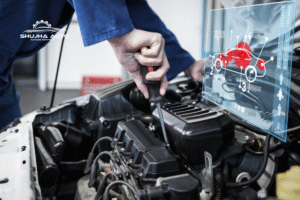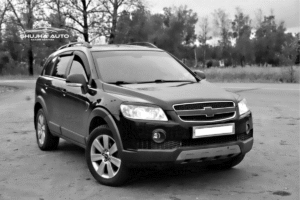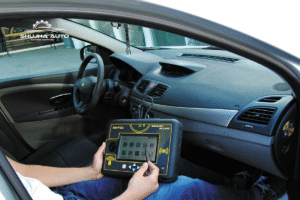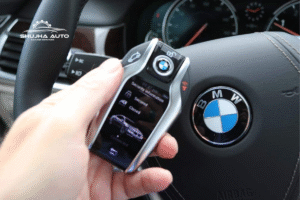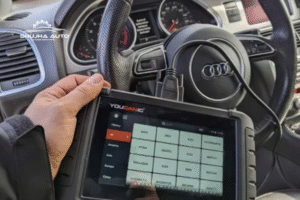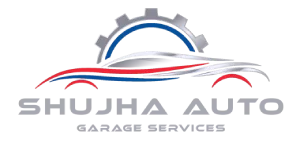Car jerks while driving? Discover 7 common reasons for a jerk in the car while driving and how to fix each issue effectively.
Driving should be smooth, not jerky. If your car starts jerking unexpectedly, it can be annoying and sometimes dangerous. But don’t worry—this is a common issue, and understanding what causes it can help you fix it before it gets worse.
From faulty spark plugs to clogged fuel systems, there are several reasons your car may not be running smoothly. The good news? Most of these issues can be fixed easily, especially with help from professionals like Shujha Auto Garage Services.
Let’s explore the 7 most common reasons your car might jerk while driving and how you can fix each one.
1. Dirty or Clogged Fuel Injectors
Your engine needs a steady spray of fuel to run smoothly. This is where your fuel injectors come in. Over time, dirty or clogged fuel injectors can mess with this process.
What do fuel injectors do?
They spray fuel into your engine’s combustion chamber. If they’re clogged, the fuel spray becomes uneven, leading to poor combustion and—you guessed it—jerking.
Signs of Dirty or Clogged Fuel Injectors:
- Jerking or bucking while accelerating
- Poor fuel economy
- Engine misfiring or rough idling
How to fix it:
- Use fuel injector cleaner additives
- Get professional fuel injector cleaning
- Replace old injectors if needed
At Shujha Auto Garage Services, we specialize in injector diagnostics and cleaning to restore smooth engine performance.
2. Worn Spark Plugs
Worn spark plugs are another common reason your car might jerk. Spark plugs ignite the fuel-air mixture in your engine. If they’re old or damaged, they can misfire.
Signs of Worn Spark Plugs:
- Engine shaking or jerking
- Trouble starting the engine
- Poor acceleration
Why does it matter?
When a spark plug misfires, your engine doesn’t get the proper combustion, which leads to uneven power delivery—and jerking.
What to do:
- Inspect your spark plugs regularly
- Replace them every 30,000 to 50,000 miles
- Use high-quality plugs recommended by your vehicle’s manufacturer
Come to Shujha Auto Garage Services for a quick spark plug check or replacement, and we’ll have your car running like new.
Location: Please Visit Our Shujha Auto Garage
3. Mass Air Flow (MAF) Sensor Malfunction
Your MAF sensor is a vital part of the engine system. It measures the amount of air entering the engine and sends that info to the car’s computer, which adjusts the fuel accordingly.
What happens when the MAF sensor goes bad?
- Incorrect air-fuel mixture
- Engine hesitation
- Jerking during acceleration
Signs of a Faulty MAF Sensor:
- The check engine light is on
- Poor gas mileage
- Car stalls or jerks when you step on the gas
You should clean the MAF sensor periodically or replace it if it’s faulty. At Shujha Auto Garage Services, we check, clean, and replace MAF sensors to make sure your car stays smooth and efficient.
4. Clogged Catalytic Converter
The catalytic converter is part of your exhaust system and is responsible for reducing harmful emissions. But when it gets clogged, it creates backpressure in the exhaust system, leading to engine performance problems.
How do you know it’s clogged?
- Rotten egg smell from the exhaust
- Poor engine power
- Jerking or hesitation when accelerating
If your car jerks while trying to speed up, a clogged catalytic converter might be to blame.
Fixes:
- Use catalytic converter cleaner
- Replace the converter if it’s fully blocked
At Shujha Auto Garage Services, we can check the health of your catalytic converter and recommend the best solution—whether it’s cleaning or replacing it.
5. Transmission Issues
The transmission shifts gears and keeps your car moving. But when there’s a problem with it, your car can jerk or hesitate—especially when changing gears.
Types of Transmission Issues:
- Low or dirty transmission fluid
- Slipping gears
- Hard shifts
- Delayed engagement
What to watch for:
- Jerking or lurching when shifting
- Grinding noises
- Transmission warning light
What to do:
- Change your transmission fluid regularly
- Get the transmission system inspected
- Repair or replace faulty parts
If you’re experiencing transmission issues, visit Shujha Auto Garage Services. Our certified mechanics will run diagnostics and get your transmission running smoothly again.

6. Bad Fuel Pump or Low Fuel Pressure
Your engine needs fuel at the right pressure to function. A bad fuel pump or low fuel pressure can cause jerking, especially under acceleration or heavy loads.
Common symptoms:
- The engine sputtering at high speeds
- Jerking while accelerating
- Trouble starting the car
What causes low fuel pressure?
- Faulty fuel pump
- Clogged fuel filter
- Leaky fuel lines
Don’t guess—let Shujha Auto Garage Services run a fuel pressure test to diagnose the problem. If needed, we’ll replace your fuel pump or fix the issue to restore engine performance.
7. Vacuum Leak or Faulty Sensors (O2, TPS)
Modern cars rely on sensors and vacuum lines to regulate engine performance. A vacuum leak or faulty O2 (oxygen) or TPS (Throttle Position Sensor) can confuse your car’s computer, leading to jerking.
What a vacuum leak does:
- Uncontrolled air enters the engine
- Messes up the air-fuel ratio
- Leads to poor acceleration and jerking
Symptoms of Sensor Issues:
- Jerking during gear shifts
- Rough idling
- Unstable acceleration
The TPS tells your engine how much throttle you’re applying. If it sends the wrong data, your car can jerk or hesitate. Similarly, a faulty O2 sensor can misread exhaust gases, leading to inefficient fuel delivery.
Let Shujha Auto Garage Services inspect your sensors and vacuum lines. We’ll pinpoint the problem and get your engine back to smooth running.
8. Conclusion
Jerking in your car is never a good sign, but it doesn’t have to be scary either. Whether it’s dirty or clogged fuel injectors, worn spark plugs, a faulty MAF sensor, a clogged catalytic converter, transmission issues, a bad fuel pump, or a vacuum leak or faulty sensors, the key is quick diagnosis and repair.
At Shujha Auto Garage Services, we’ve helped hundreds of drivers fix these issues and enjoy a smoother, safer ride. From advanced diagnostics to expert repairs, we’re your trusted partner for all car troubles.
Don’t wait until a small jerk becomes a major breakdown—stop by our garage today for a full check-up.
FAQS
Q1: Why is my car jerking when I accelerate?
It could be due to dirty fuel injectors, bad spark plugs, or even a MAF sensor issue. These problems disrupt the fuel delivery, causing jerks.
Q2: Can a clogged catalytic converter cause jerking?
Yes. A clogged catalytic converter blocks exhaust flow and affects engine performance, leading to jerking and sluggish acceleration.
Q3: What are the signs of a failing fuel pump?
Watch for sputtering at high speeds, jerking under load, or hard starts. These point to a bad fuel pump or low fuel pressure.
Q4: Can transmission problems cause a car to jerk?
Absolutely. Delayed or hard gear shifts from transmission issues are a top cause of jerky driving.
Q5: What sensors can cause my car to jerk?
A bad O2 sensor or TPS can send the wrong data to your engine, leading to jerking, stalling, or uneven performance.

